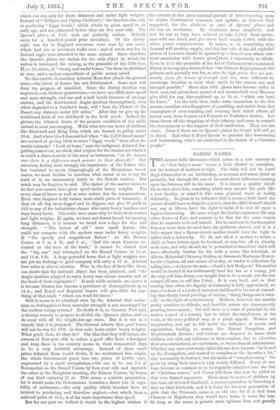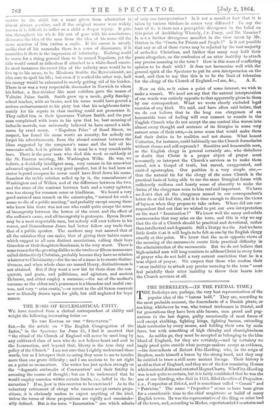BABIES' NAMES.
THE earnest little discussion which arises in a new nursery as to "dear baby's name seems a little absurd to outsiders, but the instinct of mothers is right. The baby will not be Lord High Chancellor or an Archbishop, as mamma and nurse think so probable, but through life one of the most direct influences bearing upon his fortunes will be his name. It is almost a quality which his mother gives him, something which may smooth his path like a new faculty, or retard it like some physical want or bodily deformity. So great is its influence that it seems a little hard the parent should have so despotic a power, that the child himself should not, say at fifteen, have the right to insist if he sees fit upon a legal rechristening. He must accept the family cognomen like any other decree of Fate, and consent, to be Sim for the same reason that he consents to be red-haired. But he need not be Sardanapalus Sim any more than he need have his eyebrows shaved, and it is a little unjust that a Byron-struck mother should have the right to inflict such a deformity. We do not allow a mother to tattoo a child, or burn letters upon its forehead, or snip bits off an already snub nose, and why should she be permitted to brand her child still more effectually, burden his life with a name like Adonijah, or Alietta Mehetabal Chinnery Stubbs, or Susannah Marianna Money- buckle Clayton, all real names of to-day, or render it ridiculous by calling him,—we know the man,—Noah's Ark Hodgson? The mother would be hooted if she deliberately bred her son as a scamp, yet she may call him Jerry,—or taught him to be a sneak, yet she can compel all men to call him Uriah. It is very hard, and in that coming time when the dignity of humanity is fully appreciated, we expect to hear of a revolt of universal childhood in favour of extend- ing that dearly loved privilege of babies, "doing things one's own- self," to the right of rechristening. Mothers, however, are usually pretty sensitive to ridicule, and horrible names are consequently growing less common ; but still there is a want of principle in the matter, a need of a nursery law to which the injudicious, or the weak, or the over-political may at a pinch appeal. Women are imaginative, and apt to fall under the influence of novels and superstition, leading to names like Zanoni Tompkins, and Mephibosheth Britain ; and fathers are disposed to name their children not with any reference to their comfort, but to advertise their own connections, or convictions, or, worse than all, admirationa. Whether any man ever really called his son Acts because "he'd used up the Evangelists, and wanted to compliment the Apostles a bit," may reasonably be doubted, but the habit of " complimenting " the great by using their names is very widely diffused. Percy at one time because so common as to be regularly admitted into the list of "Christian names," and Victor will from this year be added to that very limited repertoire. There must be scores of children by this time all ticketed Garibaldi, a process equivalent to branding a date on their foreheads, and it is lucky for the next generation of girls that the Princess's name is an old one, for if it had been Cmsarea or Napoleons they would have borne it none the less. So long as the name is generic mere ugliness does not greatly matter to the child, but a name given from admiration is almost always peculiar, and if the original wearer were widely known it is difficult to inflict on a child a deeper injury. It puts him throughout his whole life out of gear with his associations, dislocates the idea of the man from the idea of his name till the mere mention of him excites a smile. If his career is utterly unlike that of his namesake there is a sense of dissonance, if it resembles it there is the impression of inferiority. Nothing could be worse for a rising general than to be named Napoleon, yet the title would sound as ridiculous if attached to a white-faced curate. In most instances the secret idea of the unlucky man would be to live up to his name, to be Mirabeau Stubbs the Revolutionist, an idea sure to spoil his life ; but even if it worked the other way, half his energy would be exhausted in merely getting rid of his burden. There is or was a very respectable shoemaker in Norwich to whom his father, a free-thinker like most cobblers, gave the names of Voltaire Paine Smith. Smith grew up a meek, godly Sunday- school teacher, with no brains, and his name would have proved a serious embarrassment to his piety but that his neighbours fortu- nately for his repute in class meeting could not pronounce it. They called him in their ignorance Vulture Smith, and the poor man complained with tears in his eyes that he, best meaning of imbecile mortals, was universally believed to have earned a nick- name by cruel usury. "Napoleon Price" of Bond Street, we suspect, has found his name worth an annuity, for nobody can forget his advertisements, from the absurd contrast between the ideas suggested by the conqueror's name and the hair oil his namesake sells, but in private life it must be a very considerable bore. There is the poor man who died this week so suddenly at the St. Pancras meeting, Mr. Washington Wilks. He was, we believe, a decidedly intelligent man, very earnest in his somewhat advanced opinions, and a very good speaker, but if he had been an orator beyond compare he never could have lived down his name. Somehow the treble relation called up by it, the remembrance of Washington and of Wilkes, and of the difference between the two, and the sense of the contrast between both and a vestry agitator, was too strong for common sense or kindliness. We heard a very good-natured man remark on the catastrophe, "natural for such a name to die of a public meeting," and probably except among those who knew him there was not one who could quite escape the sense of incongruity between the horror of the event and the effect of the sufferer's name, and all incongruity is grotesque. Byron Brown may be a most respectable man, but nobody will ever believe in his verses, and Demosthenes Jones had better follow any trade than that of a public speaker. The mothers may rest assured that of all the mistakes they can make, that of giving their babies names which suggest to all men distinct associations, calling their boys Gracchus or their daughters Semiramis, is the very worst. There is some reason for the growing dislike to the twelve or fifteen names once called distinctively Christian, probably because they have no relation whatever to Christianity,—for the use of a name is to ensure distinc- tiveness, and when whole clans are named Henry, distinctiveness is not attained. But if they want a new list let them shun the con- querors, and poets, and politicians, and agitators, and ancient Hebrews, and either employ a surname,—the use of the mother's surname as the eldest son's prmnomen is a blameless and useful cus- tom, and very "aristocratic,"—or revert to the old Saxon reservoir now so liberally drawn upon for girls, but still neglected for boys' names.































 Previous page
Previous page